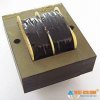ElectroNewby
Member
Hello folks !
I just got and old 1978 JVC KD-25. This has 2 inputs for microphones, VU meters and stuff... A cool vintage piece. I also got the amplifier (another module) and those don't have a ground pong.
It's just a simple cable with no ground. I do not want to risk myself and get a shock while touching those two separately at the same time. So I'd like to have them secure in case of a bad unit.
Can I simply change the cord and attach the ground wire to the metal chassis of the KD-25 and the same for the amplifier ??
Thanks for the infos. Btw, if you wanna check it out, here's a picture that I've found on the net..
**broken link removed**
I just got and old 1978 JVC KD-25. This has 2 inputs for microphones, VU meters and stuff... A cool vintage piece. I also got the amplifier (another module) and those don't have a ground pong.
It's just a simple cable with no ground. I do not want to risk myself and get a shock while touching those two separately at the same time. So I'd like to have them secure in case of a bad unit.
Can I simply change the cord and attach the ground wire to the metal chassis of the KD-25 and the same for the amplifier ??
Thanks for the infos. Btw, if you wanna check it out, here's a picture that I've found on the net..
**broken link removed**

